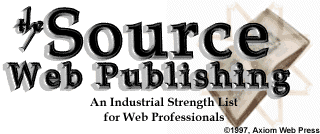
|
[Source Index] | [Feedback]
[Article Contents] |
The Nature of the Web: Conclusion |

|
[Source Index] | [Feedback]
[Article Contents] |
The Nature of the Web: Conclusion |
For users, the Web offers the quickest access to the largest store of knowledge that has ever existed. For designers, the Web offers the opportunity to reach more people for less investment than any other form of communication. While it is the best that there is, that doesn't mean it can't be better. While its imperfections may seem to allow a lower standard, that doesn't mean we should feel compelled to test the low end of these boundaries. Think of this. About 200 years ago a new art form plopped down in the laps of the English, the novel. Since then, many classics have been written. Most people can name quite a few of them. 200 years from now, there will probably still be people talking about the Web. Maybe it will just be historians. Maybe the Web will still be a household word or a fact of everyday life. In either case, do you want these years of the Web's infancy to be known as a time when the first classics of the medium were developed that paved the way for future geniuses, the Twains and Kiplings that might emerge? Or do you want these to be seen as stumbling years that were constantly 'Under Construction' and forcing a world ready for something different back to the flat mediocrity of television until the promised land of a Global Village did something about the stinking dung heaps festering on every sidewalk?
Well, if you're up to the challenge. Let's break out the brooms.
MRC

|